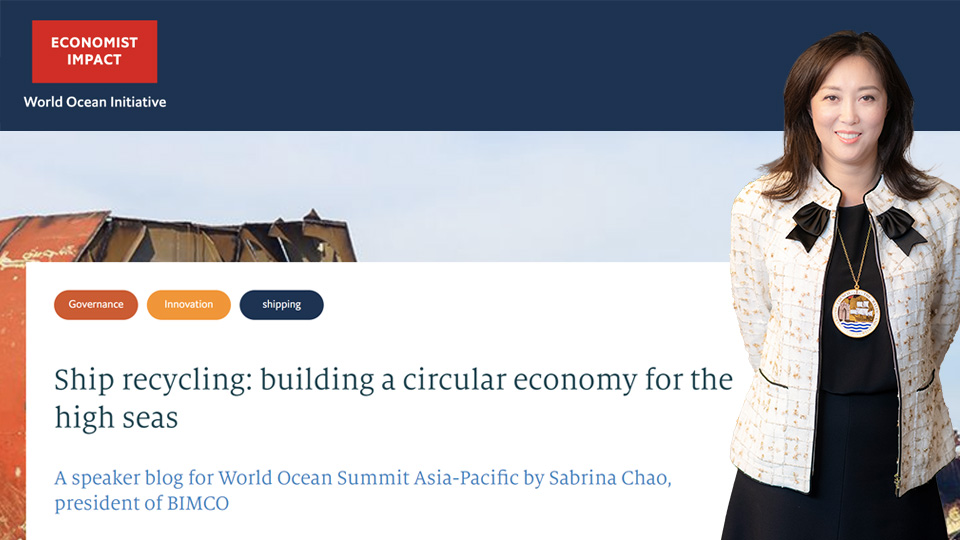
CONTACT BIMCO
Communications Team
Copenhagen, Denmark
- +45 4436 6800
- comms@bimco.org

A speaker blog for World Ocean Summit Asia-Pacific by Sabrina Chao, president of BIMCO, published in The Economist Impact, September 2020
About 90% of the world’s ship recycling activity takes place in Bangladesh, China, India, Pakistan and Turkey. In India’s Gujarat state, the Alang area alone directly employs around 60,000 people when all its yards are occupied, in addition to providing many indirect jobs. Unveiling its 2021 budget earlier this year, India’s finance ministry announced plans to double the country’s ship-recycling capacity by 2024.
The steel industry is one of the top three producers of CO2 in the world. Ship recycling supplies a large quantity of scrap metal to the steel and iron industries and reduces the need to produce virgin metals to meet demand. A study commissioned by the World Bank in 2009 found that Bangladesh satisfied 50% of its steel needs from national ship recycling. The figure was around 15% for Pakistan and 5-6% for India.
Although ship recycling is beneficial from a life cycle point of view and provides thousands of jobs, the industry faces great challenges when it comes to occupational safety and environmental impact. As the world fleet grows, the need for ship recycling will rise, and the potential to improve and upgrade South Asia’s ship-recycling industry is huge. Now is the time to act and continue to focus on improving safe working conditions and environmental sustainability.
Supporting the Hong Kong International Convention for the Safe and Environmentally Sound Recycling of Ships is a vital first step. The Hong Kong Convention, developed over three and a half years in cooperation with the International Labour Organisation (ILO) and the parties to the Basel Convention, was adopted by 63 countries in 2009. It addresses safety, proper working conditions, environmental issues and how to deal with hazardous substances. However, the convention still has not been ratified by enough nations to enter into force.
Second, support from within the shipping industry is important. Decision-makers can help improve conditions in recycling facilities. Many South Asian yards are already taking the initiative to do so, and the organisation of workers is gradually moving ahead in Alang.
In the transitional period before the convention enters into force, it is important to use recycling yards that already comply with the convention’s requirements. Ships can be recycled more responsibly while we wait for a global commitment from governments and nations to ratify the convention.
In the meantime, a vast number of guidelines and contracts have been created to help the industry. BIMCO, the European Commission, the OECD, the International Maritime Organisation and its sister agencies, including the ILO, are among organisations that have developed extensive guidelines to facilitate responsible ship recycling. The guidelines address the development of ship-recycling plans, authorisation of facilities, the inventory of hazardous materials and working conditions, to name a few.
However, if these tools and guidelines do not become mainstream and the global regulatory framework—the Hong Kong Convention—is not ratified by sufficient nations to come into force, the opportunity to further develop responsible ship recycling and thereby promote a sustainable global circular economy could be lost.
There is a long way to go, but a fully sustainable ship-recycling industry is possible and within reach. The economic, occupational, social and environmental benefits are too big to be missed.